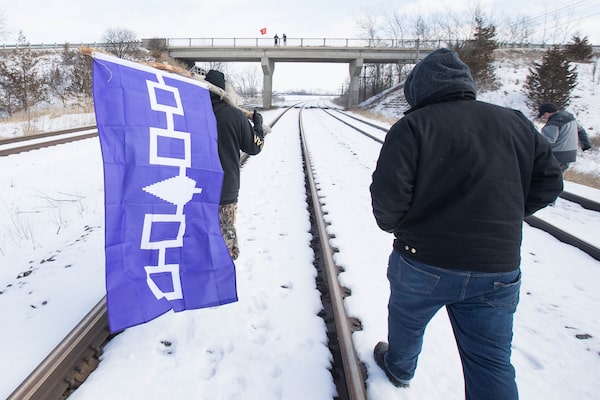
A man carries the Six Nations flag on the closed train tracks in Tyendinaga Mohawk Territory, Ont.Lars Hagberg/The Canadian Press
Canada’s most populous Indigenous reserve says countless residents have been left out of the $1.47-billion federal Indian day school settlement, and has applied to extend the January deadline by three years.
In a motion filed on Tuesday, Six Nations Council, the band government representing Six Nations of the Grand River in Ontario, argues the claims process was culturally insensitive, lacked adequate notice and provided insufficient assistance to class members.
Claimants have until Jan. 13 to apply for compensation under the settlement, approved in 2019. The motion asks for an extension until Dec. 31, 2025.
“We wanted to avoid legal action,” said Chief Mark Hill. “I just know far too many people who are unable to make the current deadline.”
The settlement agreement came out of a lawsuit heard in Federal Court between former day school students, represented by Gowling WLG, and the federal government. In a statement, Gowling said it was unaware of the motion and could not “comment on third-party views about the court approved settlement agreement.”
The office of Crown-Indigenous Relations Minister Marc Miller said the existing deadline came out of a negotiated agreement between the two parties and could not be unilaterally amended.
The day school system ran from the 1860s to 2000, when the last school was closed or transferred to the community. Unlike residential school students, the estimated 200,000 pupils who attended day schools returned home each night. Both systems suppressed Indigenous languages and culture, had religious affiliations with various churches, and were sites of frequent physical and sexual abuse.
The 2006 Indian Residential School Settlement Agreement excluded day school students. Three years later, day school students filed a class-action lawsuit in Manitoba and retained Gowling in 2016.
Ottawa agreed to set aside $1.27-billion for $10,000 payments to each approved claimant. Former students who experienced more serious cases of physical or sexual abuse qualify for higher levels of compensation topping out at $200,000.
As of Nov. 29, 177,514 claims had been received and 122,984 had been paid out, according to Deloitte, the claims administrator. Third-party actuarial estimates had put the number of potential claimants at between 120,000 and 140,000.
There has already been one deadline extension of six months, which was provided for under the settlement terms.
The motion contends that much of the three-year application window fell during the pandemic, when Indigenous communities were locked down, halting in-person education and assistance sessions concerning the settlement. Online resources were of little help owing to limited internet access in many Indigenous communities.
Audrey Hill, a Six Nations member named in the motion, said she took months to assemble her claim. A retired social worker, she used traditional and Western therapy methods to recall episodes from her time in day school and to deal with the associated trauma. Some school records could only be accessed once pandemic-related lockdowns had been lifted.
Once she had completed her claim, about 24 people approached her for help with their own claims.
“This is not an easy thing to do,” she told The Globe and Mail. “There is a long process for people to explore their childhood trauma. It’s delicate.”
The claims process offered telephone numbers for legal assistance and counselling. Ms. Hill considers the approach culturally inappropriate.
Lately she’s been working with a recently incarcerated woman who said she couldn’t make a claim because she lacked adequate identification. Ms. Hill said there are more potential claimants in correctional and mental-health facilities who haven’t had a chance to apply. “The federal government hasn’t provided any resources to help these people,” she said. “With more time and more support, we can get to them.”
 Patrick White
Patrick White